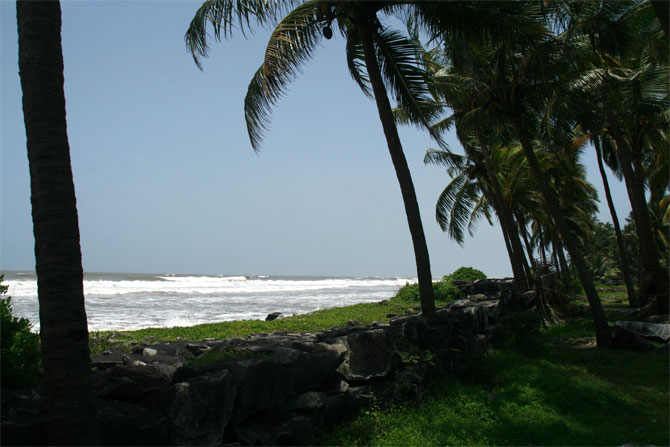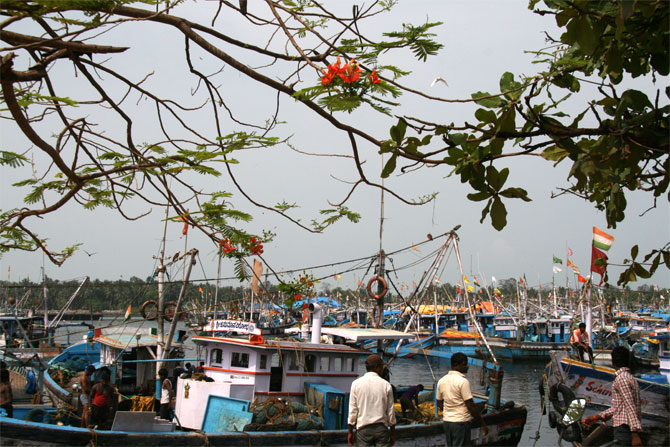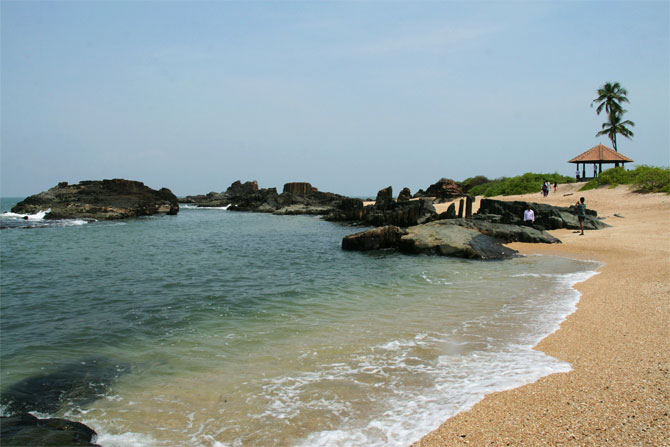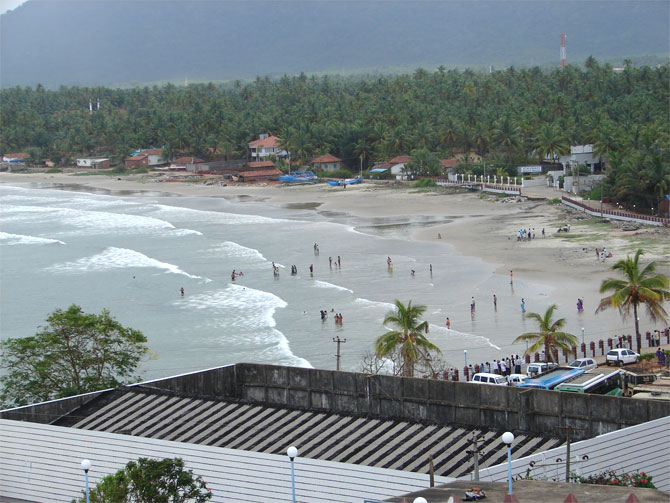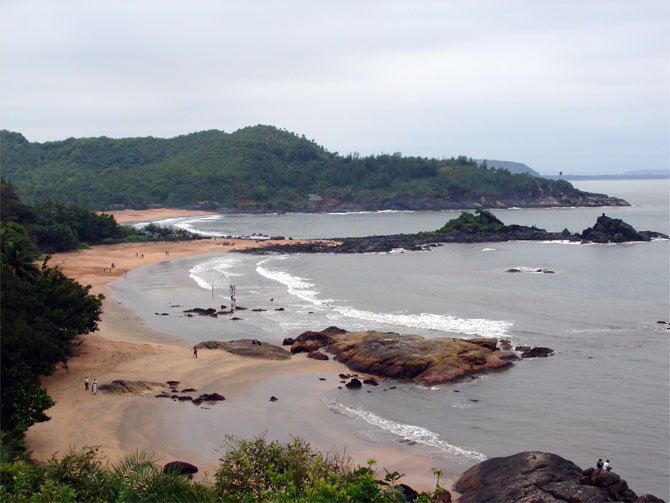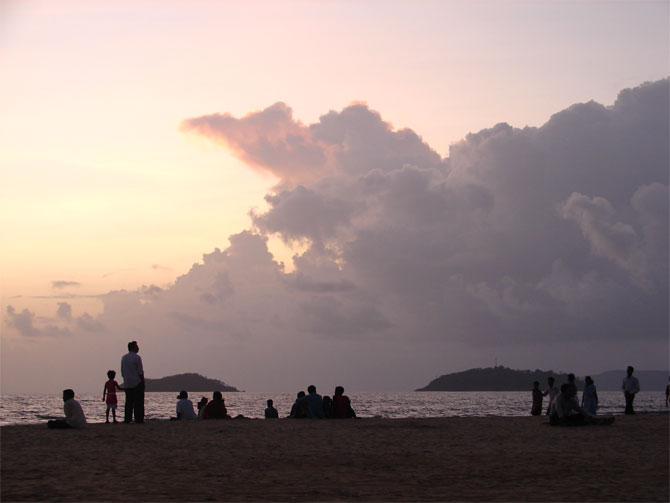 | « Back to article | Print this article |
Travel: Coasting in the rain
Heading to the coast at the height of the monsoons might seem like a foolhardy exercise but there’s something vicariously pleasurable in debunking conventional wisdom.
It doesn’t stop at that: the untamed beauty that settles on the sea is riveting. It takes an intrepid spirit to appreciate the glorious fury of giant waves lashing against the coast and a perpetually stormy grey sea stretching into the horizon.
It is with these images that I set out along the Karnataka coast, a 320 km stretch from Mangalore to Karwar. The stretch hides some of the most stunning sights, and it is not just about beaches.
There are forests, spiritual centres, pretty towns and wonderful food all of which combine to make the journey a truly magnificent one. I couldn’t wait to get started.
Having arrived in Mangalore earlier in the day, I knew there were sights to see in the city such as the St Aloysius Church and temples, but decided to ditch them and headed to Someshwara beach in Ullal, about 12 km south of the city.
It was pristine and clean with a rocky outcrop, called the sunset point, ideal to lounge and gaze at the sea and its changing colours.
Want to share your travel story and pictures? Simply write in to travelpicsga@rediffmail.com (subject line: 'My Travel Story'), along with pictures of the destination you're writing about. We'll publish the best ones right here on rediff.com!
Travel: Coasting in the rain
The waters were rough and ferocious, and the constant pounding against the rocks made for a unique orchestra. I stayed for long time absorbing the drama. Though it was not raining, the horizon was cloudy and hazy and I couldn’t see the sun actually sink but everything turned a pale orange and then pink and it seemed like an apt start to the journey.
Heading North the next morning, I arrived in Udupi, an hour from Mangalore. There’s more to it besides the ubiquitous Udupi cuisine. Life revolves around the legendary 800-year old Krishna temple and other temples on ratha beedi (car street). The streets were washed clean by incessant rains while strains of chants and devotional songs filled the air as I headed to the temple.
Inside, the deity, a churn-wielding infant Krishna, was adorable and decked out in shining diamonds. Outside the temple, the shops lining the streets selling knick-knacks were coming awake, even as devotees visited not just the main temple but others surrounding it.
In keeping with its reputation, there were a couple of vegetarian restaurants around the temple, but the place I headed to was Mitra Samaj which has immortalised the dosa and is probably the quintessence of Udupi.
From Udupi, I headed to Malpe, about 4 km to the west, a docile place and mostly a fishing centre though the pristine beach was inviting and I merrily splashed around for a few minutes. But soon the sky getting dark and I headed to a resort nearby from where I watched the monsoons unleash their fury.
Travel: Coasting in the rain
During non-monsoon season, Malpe is the place to catch a ferry to reach the spectacular St Mary’s Isles (6 km), a stunning rocky basalt formation that rise out of the sea. Legend has it that Vasco da Gama first dropped anchor here on his expedition before entering the country from further South. However, during the rains, trips to St Mary’s Isles are suspended.
My disappointment didn’t last long for soon the rains got more vigorous and the sky and sea became one, a uniform grey colour, completely obliterating the horizon and I watched the unfolding drama with fascination. Later, I feasted on absolutely delicious fish curry and rice and fish fry at Mahalakshmi Hotel.
I then continued northwards from Udupi to Maravanthe, a rather mesmerising place. A strip of black asphalted road separated the Arabian Sea on the left from the Souparnika river on the right, which was swirling with muddy monsoon water. The river which descends from the lush green Western Ghats, flows along for a distance running parallel to the coast before it merges.
When the rains are particularly bad the river is even known to rise so high as to run over the road and driving along and crossing it could be hazardous. I skipped the beaches nearby and preferred this, excited to stand on the road and watch the waters swirling on both the sides.
Travel: Coasting in the rain
From here, Murudeshwar was about an hour’s drive. Another temple town, Murudeshwar encompassed a rather unique combination of kitsch, piety and some of the most dramatic views of the sea.
The entry into the little town was rather mundane, but the little road suddenly yielded to the sea and revealed a rather surreal sight – a towering cross-legged statue of Shiva on a hillock.
But it was the sea that was absolutely enchanting – if the sun emerged, it became a tranquil blue, but when it disappeared, the waters turned a furious grey. It was riveting to watch this performance from the hillock which provided a panoramic view of the sea and the coast around.
Travel: Coasting in the rain
Less than an hour’s drive from Murudeshwar is Gokarna, one more temple town, with an old world charm and a beach behind the temple. However, it was Om Beach, a short distance away that was scintillating.
The beach had gained its name from the peculiar shape of the coast which resembles the venerated Sanskrit sound. Needless to say it was breathtakingly beautiful, especially when viewed from a promontory high above.
A little structure provided some shelter to sit and watch the dark clouds sweeping the horizon and shedding their weight. The dark waves crashing against rocks and the promontory made for a fascinating tableau.
Travel: Coasting in the rain
The last stop on the circuit was Karwar, with an array of stunning beaches. But the place I headed was Devbagh, an island about 3 km out in the sea, which can be reached through a boat ride. A state-run resort provided accommodation but the island was largely deserted and I had the run of the place, except for a fishing community which was friendly and happy to let me watch them bring in their catch.
Thick, towering trees shielded the ground from sunlight while hammocks strung across tree trunks make for great lounging places to watch the sea. However, for much of the time I was there, the storm raged and rain came down in sheets.
The entire place assumed an eerie appearance, enough to give one the heebie-jeebies, although I was thoroughly enamoured by the fierce beauty unleashed by nature. It proved to be a fitting finale for a rain-soaked drive through the Karnataka coastline.
Want to share your travel story and pictures? Simply write in to travelpicsga@rediffmail.com (subject line: 'My Travel Story'), along with pictures of the destination you're writing about. We'll publish the best ones right here on rediff.com!
